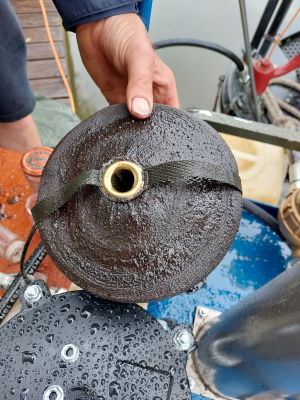Polishing Your Fuel
We can either visit your boat at its normal mooring or you can sail to a mooring point where we can meet up. But remember, we have to get our equipment from our van to the boat, so reasonable access helps.
We use special equipment to clean and polish your fuel. To remove the sludge that is diesel bug, we pass the fuel through our one micron filters (a human hair is roughly 70 microns in diameter, on average). You can see the state of the filter after this in the images here. Clearly this is not going to do your engine any good!
Water, necessary for the diesel bug to grow, is removed from wet, saturated diesel using filters which remove the water done to 100 parts per million. This greatly reduces the chance of the problem returning in the immediate future, especially if the storage tank is kept closed to the damp outside atmosphere.
Water and diesel bug lead to corrosion, and our system incoporates a magnet which removes rust and any fragments of metal.
The diesel fuel is pumped through the system at a rate of 25 litres per minute. This sounds fast but the total time involved depends on how dirty and contaminated the fuel has become; however a 150 litre tank full, on average, would take 2 to 3 hours to clean if the tank or diesel is in a poor to medium condition. And slightly longer if the tank and diesel are highly contaminated. This is due to the fuel being repeatedly passed through the filtering system until it reaches a satisfactory level of cleanliness.
-
Clean filters to use.

-
Pumps being connected.

Used filters.

Filtration starts

Filtration continues

After filtration
